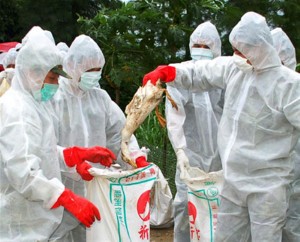The H7N9 strain of bird flu has killed a man in the Chinese province of Zhejiang, state media said Wednesday, bringing the total deaths attributed to the virus to three since the first human cases.
The victim was one of two more H7N9 avian influenza infections reported in Zhejiang, in the east of the country, the official Xinhua news agency said citing local authorities, bringing the total number of cases to nine.
According to a statement issued by the provincial health department, a 38-year-old chef surnamed Hong died on March 27. The man, who worked in Jiangsu Province, where four other cases of H7N9 bird flu have been identified, became ill on March 7 and returned to his home in Jiande, Zhejiang, where he was admitted to a hospital on March 18.
The provincial and national disease control centers confirmed on Monday and Wednesday, respectively, that he was infected with H7N9 avian influenza.
Two other deaths have been reported, both in China’s commercial hub of Shanghai. Other cases have been happened in the eastern provinces of Jiangsu and Anhui, the government has said.
The World Health Organisation on Tuesday played down fears over the new type of bird flu, but said it was crucial to find out how the virus infected humans.
A total of 183 people who came into contact with the two men have so far shown no symptoms of fever or respiratory illness, the statement added.
Zhejiang has initiated an emergency response for epidemics based on regulations of the Ministry of Health, and relevant departments have been asked to take precautionary actions toward disease control.
Seven other H7N9 bird flu cases had been reported previously, two in Shanghai, one in Anhui and four in Jiangsu. The two in Shanghai died and the other five are in critical conditions under treatment in Nanjing, capital of Jiangsu.
Authorities in Chinese regions have ordered health institutions to step up monitoring.
On Wednesday, Pang Xinghuo, spokesman for the Beijing Municipal Disease Control and Prevention Center, said the capital would not rule out the possibility of H7N9 cases popping up.
“With a massive population flow every day, the metropolitan area cannot rule out H7N9 risks. However, with the battle experiences of SARS and H1N1 influenza outbreaks, the city has been well prepared for epidemic control,” according to Pang.
He said the center has ordered hospitals to include H7N9 bird flu testing in routine monitoring and to train hospital staff on how to treat pneumonia caused by unknown factors.
The subtype of H7N9 bird flu virus has not been contracted to human beings before. It shows no signs of being highly contagious among humans, according to the clinical observation on the cases’ close contacts.
However, as few cases of human infection of H7N9 have been found, relatively little research has been done on it. There are no vaccines against the H7N9 bird flu virus either at home or abroad.





